|
|
|
down the Napo River
Thursday, February 3 2005
setting: Hotel San Francisco, Old Town, Quito, Ecuador
I didn't feel especially weak or otherwise sick this morning, but by this point I was wary of drawing conclusions. I knew there was a good chance I might revert to an achey, feverish state at any time. Still, I thought we should get going while the going was good. So we caught a cab to the Quito airport and arrived there an hour before we needed to. On the way we did our best to understand what the cab driver was saying. He spoke Spanish with a particularly incomprehensible accent. We stopped at a light at one point and a bus quickly filled our cab with acrid fumes. Matter-of-factly, the cabbie rolled up the windows. But by that point it might have been better to roll them down.
The great thing about the domestic flight section of the Quito airport is the availability of wireless internet. PLANMAN was still open, probably in an unintentional third world kind of way. It was particularly easy to access in the part of the airport one waits in before going through security. I took the opportunity to download a shitload of articles written by Malcom Gladwell, though a better use of my internet time would have been to download the Zio! CF card reader driver for my iBook. But I was still somewhat ill and my thinking wasn't entirely clear. I was, however, aware enough to know that our internet time was being wasted when Gretchen used it to read a longwinded email she'd received.
The place we'd be staying in Amazonia was the world-famous Sacha Lodge. It's some fifty miles east of the obscure frontier town of Coca (aka Puerto Francisco de Orellana). To get there, we'd be taking a short flight over the Andes to Coca and then a two hour "canoe ride" down the wide, muddy Napo River. The Napo is a direct tributary of the Amazon. In the Quito airport, we were eventually met by the Sacha representative, who put us together with the other Sacha people and saw us off on the plane to Coca. The flight took only about twenty minutes. Over land it would have been an arduous mountain journey lasting ten hours.
The Coca airport was even smaller than the one on Baltra had been. It looked like a small town Greyhound station. As we walked out the door we were greeted by a group of local children who hang out and take whatever passengers are weary of holding. Usually this consists of half-drunk plastic bottles of Pepsi (given to passengers during the flight), but Gretchen also gave them a half loaf of bread and various canned goods left over from our hotel room picnic last night. They went crazy for those things, much more so than they had for the Pepsi. In retrospect I feel a little bad about giving them my drink. What with my illness, I probably introduced a potent new strain of common cold to Amazonia.
Coca is exactly the way you'd imagine a tropical frontier town would be. It's a riot of arbitrary colors and half-finished construction, with dusty vehicles and pedestrians going about their business. Our destination was Sacha Lodge's dock on the Napo. A strong morning downpour kept us holed up there for most of an hour. In the meantime we chatted with our fellow Sacha tourists. There was an American couple from Cleveland who chatted with us first. He was a lawyer "for the poor" (or so he said) but that was completely negated by her job, head of human resources for Glaxo-Welcome ("the enemy," as Gretchen pointed out, particularly back during her days as a union organizer). Later we overheard them saying that the only reason they'd come to Ecuador was that it was much cheaper than Europe. As Bush administration policy continues to destroy the value of the dollar overseas, the only countries that can be affordably visited are those that have foolishly chosen the dollar as their official currency.
The Americans did have one bit of interesting information that they shared with us. Evidently the place we'd be staying, Sacha Lodge, had found its way into a book called 1000 Places to See Before You Die.
The other two in our contingent were a couple of older women from Liverpool, England. They introduced themselves by making favorable mention of the hat I'd bought in the Galapagos, the one Gretchen had rescued the other day off the Golondrina. I told them that such hats are very important under the relentless sun of the Galapagos. I added that it's very important to not miss any exposed spots on your body when I applying sun screen. I told them about how, on my second day in the Galapagos, my lips had swelled up from sunburn. "I looked like Mick Jagger," I said. "For free!" one of them responded.
When the rain slacked off we were told it was time to board the canoe. It was a big canoe, wide enough for people to sit three or four abreast. Thankfully it had a roof to protect us from the rain, which continued to fall on and off for the entire ride downstream to Sacha. Since the boat lacked a windshield but traveled at nearly thirty miles per hour, those in the front needed a good defense against the rain. We were all given ponchos, but it wasn't quite enough for comfort.
Meanwhile I was still fighting my cold, which still manifested as a sore throat and a irrepressible cough. Gretchen had bought some new throat lozenges in Quito that contained some chemical with a -caine suffix. Indeed they contained a powerful topical pain killer, but the effect vanished nearly as soon as the lozenge itself did.
On the way down the Napo we were treated to an ever-shifting view of riverside rain forest, with frequent tall, spectacular trees and infrequent small riverside villages, each with its own set of steps hacked into the soil of the river bank. The construction techniques of riverside houses varied a great deal, but many had primitive thatched rooves, the kind I hadn't seen since South Africa. Villagers had their laundry hanging out despite the rain and on several occasions we saw children playing in the river and adults moving about in tiny boats. We also encountered a number of high speed boats coming from the east. Coca has a bridge across the Napo, but that was the last bridge we saw in our journey. We didn't even see any ferries, though there were a few well-developed docks serving the petrochemical industry. The Napo region, you see, lies atop Ecuador's biggest deposit of oil. If there's ever a reason for the United States to promote democracy in Ecudaor, the Napo region will be it.
We landed at the Sacha Lodge dock and regrouped in a nearby building as a group of Sacha employees (all of them natives) offloaded our gear and transferred it into big push carts to be wheeled down the long trail leading to the actual lodge itself. I was nervous about my fragile iBook (in a way that I probably wouldn't have been about my Sony Viao - I've had them both open!), so I elected to carry my own luggage.
In Coca we'd been joined by Richard, the guy who would serve as our naturalist guide in the rain forest. Richard was from South Africa, but he'd been at Sacha for ten months and had absorbed a great deal about the local biology. He was also fluent in Spanish, the consequence of a crash course he took as a prerequisite to joining the Sacha staff. Being South African, he was also conversant in Afrikaans and Zulu as well as English.
Our walk from the Napo was along a long boardwalk that ultimately led to a small black water lake. Here we met Ernest, our "native guide." In our nature walks Ernesto would be providing the local folkore, medicinal knowledge, and a lifetime of experience to complement what Richard knew about the underlying biology and ecology. Since Ernesto could only speak Spanish, it was up to Richard to serve as translator for the mostly English-speaking people on the tours. Unlike, say, the young, international contingent on our Galapagos boat, most of the people who opt to vacation at Sacha lodge are older Americans who don't understand a word of Spanish aside from "ola" and "gracias."
Sacha aims to be a cut above other nature lodges around the world, but they've duplicated the basic prototype. This extends even to the unnecessarily colonialist details. So it was up to Ernesto, our native guide, to do the paddling when our group had to cross the black water lake. And once we'd landed on the boardwalks of Sacha, it was on Ernesto to carry our luggage to our room. This all seems irritatingly anachronistic and unnecessarily non-egalitarian to people with our world view, but I suppose plenty of well-heeled visitors to Sacha from older Jim Crow-era generations would be put off if they found themselves having to carry their own luggage to their rooms.
The rooms at Sacha were arranged in a series of duplex thatched huts, each connected to other clusters of huts by boardwalks. The surface of these boardwalks was often comprised of springy planks of palm wood. These planks were so springy that I feared I might fall through, but evidently this technology is tried and true, adapted directly from indigenous villages. Inside, each room comes with a bathroom, a shower, and two beds. There's also a porch with a hammock. It's all very rustic and pleasant, but with just enough of the modern to keep a civilized person from going postal. The showers each have their own propane tank for hot water and the rooms come equipped with several plugs carrying 120 volts of electricity (actually, even the Golondrina had those). But unlike the Golondrina, the plugs at Sacha are all of the two-prong variety, and I was forced to break away the (mostly useless) ground pin of my iBook's power adapter in order to plug it in.
After we'd dropped off our stuff in our room, we reconvened in the central Sacha building. It's a big place with a buffet dining room on the first floor and a full bar on the second. There's also a three or four story tower where one can climb to watch the oropendola birds fluttering about amongst their cleverly-woven hanging nests.
After being given a complimentary drink of "Jungle Juice," everything was explained in detail. It makes a huge difference in one's enjoyment of a nature outing if one has an idea what is going to happen. We were also cautioned that Sacha's sewage system was sensitive like others throughout Ecuador and that we weren't supposed to flush toilet paper down the toilet. Instead we were supposed to place it in a bucket beside the toilet. Evidently this had also been the policy on the Golondrina, something we didn't learn until Gretchen (a "yellow=mellow/brown=flush it down" kind of girl) left some toilet paper in the toilet for the staff to discover while straightening up our room.
Dinner at Sacha Lodge is a lavish ritual. You sit with your naturalist guide (furthering the colonialist vibe, the native guide is absent) and you select items from a buffet. It's a rich spread if you're an American or European who likes bland comfort food, but to someone with the food sensibilities from my household it's pretty thin pickings. The vegetables are mostly segregated according to kind and all the main courses are rich in meat and low in carbohydrates. In our paperwork Gretchen had made clear that she is a vegetarian and that I eat fish, but we could see no main courses suitable for either dietary restriction. What we didn't know was that our food was being prepared special and would be brought out to our table.
During this first dinner we sat at a table with all the tourists who'd flown in from Quito this morning: the Cleveland couple and the two Liverpudlians. In addition there was our guide Richard as well as another naturalist (English speaking) guide. We'd be split into two subgroups, with one group led by Richard and the other group lead by the other one, let's call him Tim. Tim was an American and he got started on the wrong foot with Gretchen as she wondered aloud what the vegetarian dinner options might be. Tim made the mistake of adopting a slightly mocking tone as he said "Well, I don't think there's going to be any tofu." Gretchen responded with a tone I'd recognized from her conversations with the irritating German woman and remember thinking "Why does it have to be this bad so early? We're going to be with these people for a few days!"
After that had blown over, Tim admitted that he'd only been working at Sacha Lodge for two weeks. Compared to Richard's ten months, that seemed like pretty shallow experience. Luckily, though, our group was divided so that we were put with the British woman and led by Richard, while the two Americans were led by Tim the greenhorn. That division probably made the most sense, since the the guy from Cleveland was a chronic complainer armed with bad jokes and an injured knee and neither he nor his wife seemed especially educated (or interested) in biology.
After dinner Richard and Ernesto took on us on night walk through the rainforest, illuminating things along the way with powerful flashlights. We didn't see all that much: a huge tarantula, a foraging armadillo, stick insects similar to ones in the Catskills, and a leaf frog.
Interestingly, there were few mosquitos in the forest. Gretchen and I hadn't bothered to put on insect repellant, and it proved unnecessary. The lack of biting flies challenged another of my preconceived notions about the rain forest, that part of why it wasn't overrun by people was that it was such an inherently uncomfortable place. That description applies much more to the Catskills than it does the rain forest around Sacha Lodge.
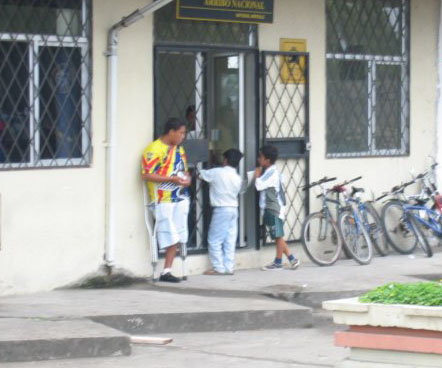
Local boys scoring free stuff from travelers arriving at the Coca airport.
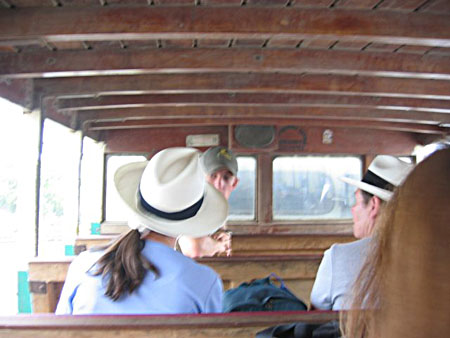
On the bus from the Coca airport. Richard is the white guy at the front of the bus.
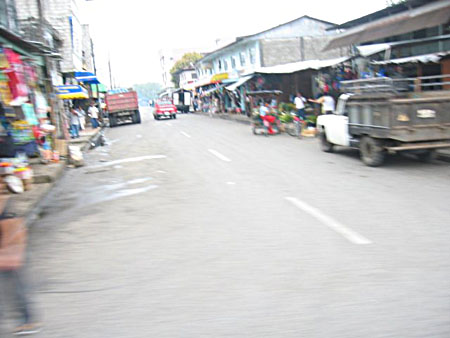
Streets of Coca.
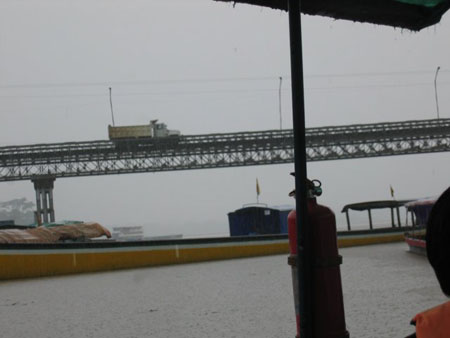
The one bridge across the Napo at Coca.
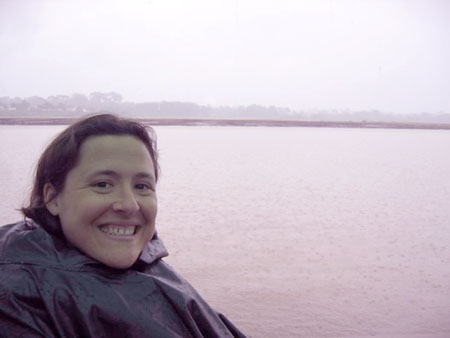
Gretchen in the big canoe on the Napo.
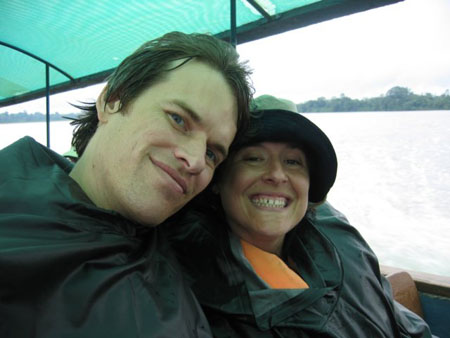
Gretchen and me on the Napo.
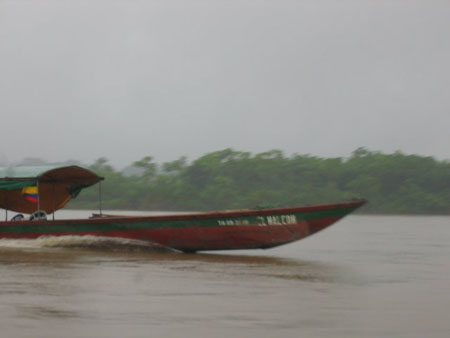
A big canoe similar to ours on the Napo.
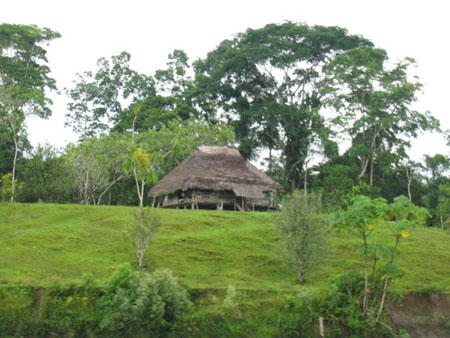
A thatched hut on the banks of the Napo.
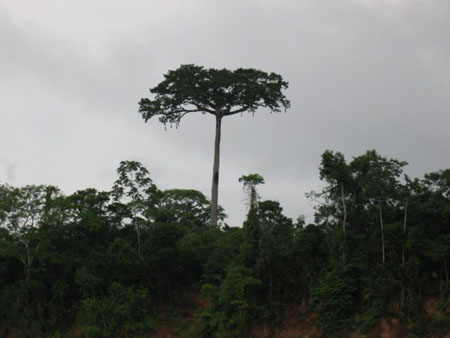
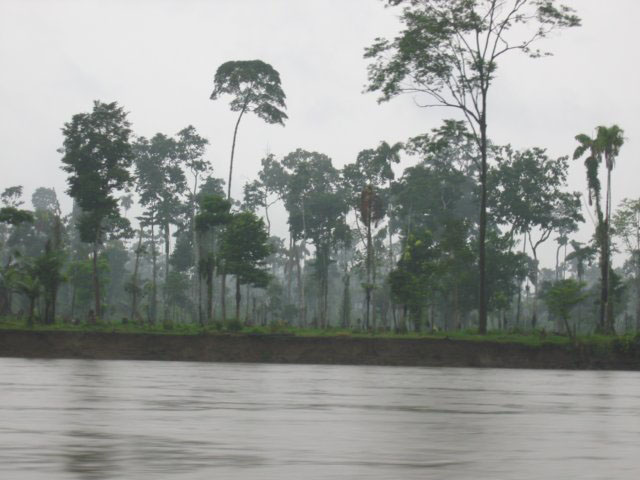
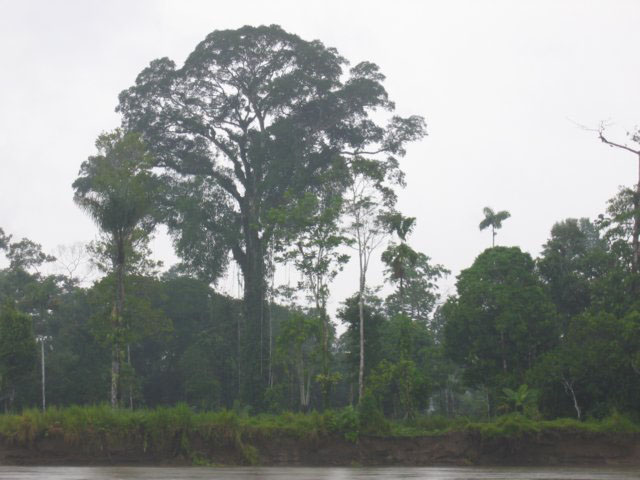
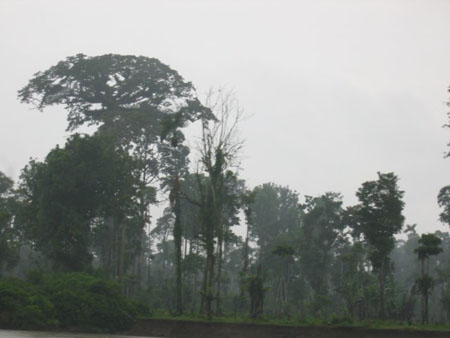
Various Napo shoreline trees.
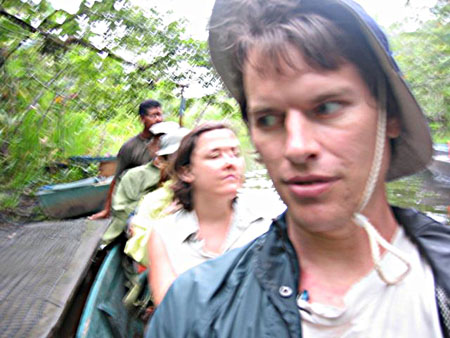
On a little canoe crossing the black water lake in front of Sacha Lodge.
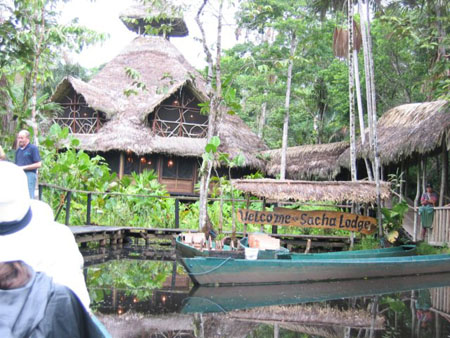
Sacha Lodge.
For linking purposes this article's URL is:
http://asecular.com/blog.php?050203 feedback
previous | next |













